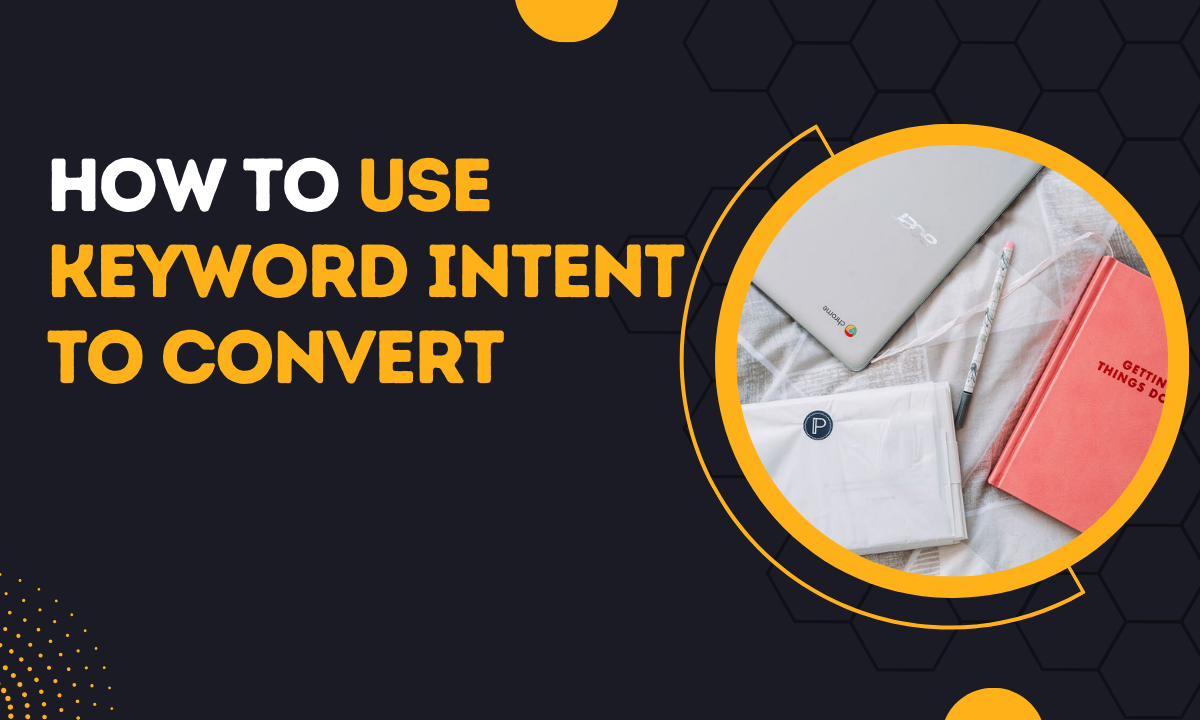How To Use Keyword Intent To Convert
Keywords are the basic tools for optimizing your blog for SEO. But not all keywords convert equally. More importantly, the way keywords are used by people online has a huge impact on your sales and conversions finally. That’s because there is something called keyword intent.
In an earlier post, we had mentioned the relation of long-tail keywords with sales and conversions. But here we’re not talking about long-tail keywords alone, but more importantly about the intent behind a user’s search.
So if we know this much, it’s important to examine “keyword intent” and its potential to convert.
Now, what is keyword intent?
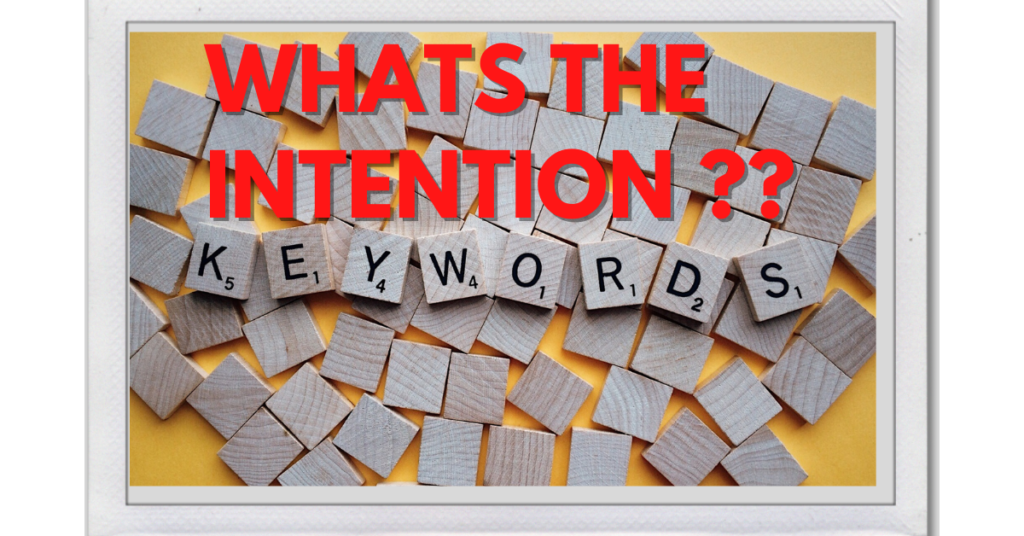
Keyword intent indicates the purpose of the user’s search. It tells us what the user is likely to do when searching for a specific keyword. You can serve the users’ needs better by matching content that meets their intentions.
Studying keywords intent to convert is, therefore, your basic step when analyzing potential customers on line.
Types of intent
There are three to four commonly understood search intents that lead us to categorize a particular search result. The four types of navigational intent are informational, navigational, investigational, and transactional.
These four intents progressively culminate into a sale, even if that happens in stages.

But there is another set of intents that are purely users checking out things. They have no intent to purchase anything.
These keyword intents do not convert and they just belong to the “tire kickers“.
Wisely so, it is recommended not to waste too much time or energy on such users.
Informational Keyword Intent
The larger majority of users online are searching for information. We all want answers to our burning questions and that’s the way we all start gathering info.
See how we search our own info on Google and YouTube. Essentially we hunger for more info on something , and go on a hunt for it.
Usually informational intent keywords originate from a curious mindset.
Typical informational intent keywords are
- “How”
- “why”
- “where”
- “what”
- “who”
- “examples”
- “ideas”
- “tips”
- “guide”
- “tutorial”.
Maybe we want a problem solved, or more information on an interest that needs to be satisfied.
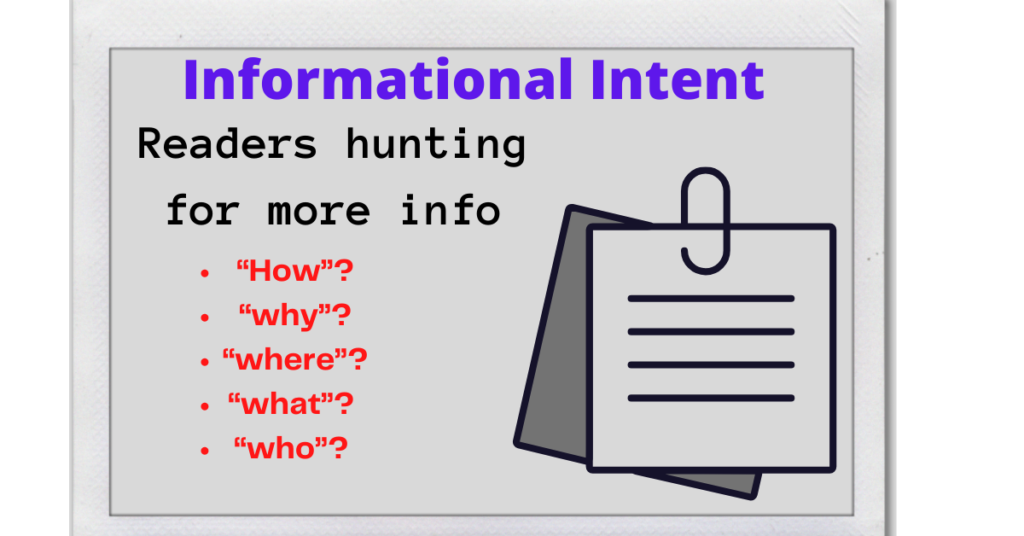
Most times such searches with information-intent keywords wont culminate in immediate sales.
But still, there is a cause for encouragement. Because these searches certainly indicate the potential for further engagement with the customer.
In fact, this kind of intent should prompt you to create a “how-to” article. This way, you supply much-needed information through this “how-to” article
Now that’s something that urges your reader to come back again for more. In the same way, you can create a “how-to video” for the same purpose.
For example if you search for the term ‘selection of photo frames’, you may find Shutterfly.com coming up in your search results.
And on the Shutterfly site the article on “How To Choose The Perfect Picture Frame” does the ideal job. It is informational, engaging, and answers a reader’s questions.
Well, that’s also great for the site, because it has gained a loyal reader who spells a potential conversion later.
Yet, any informational search by itself doesn’t contain an outright ‘keyword intent’ to convert.
Navigational Keyword Intent
Navigational intent is confirmed when users type in keywords having a brand name or a website name.
Typical keywords used “Name-of-product”, or “name-of-service”.
This proves that they are already familiar with the company and they simply want to reach your site. In short, they’re simply navigating towards your site.
Why they enter your site name in the Google search bar is because that is the easy option. Most likely they have got your site name from another website as a backlink (this is an important indicator). Or possibly, as a reference from another source, and want to check out your site.
Perhaps they have lost your URL or link.So they just punch in your site name in Google and search for you, and navigate toward you.
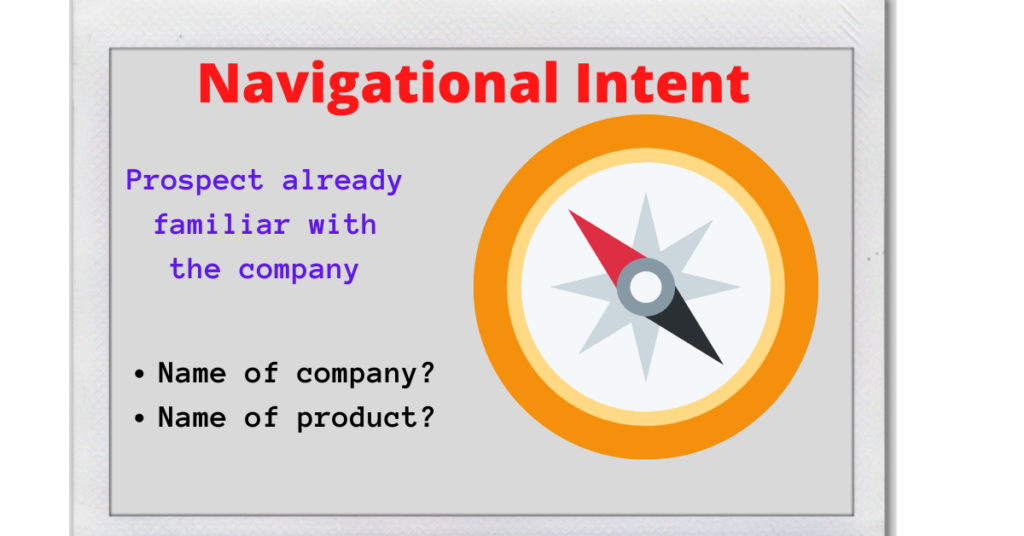
They’re not necessarily doing that because your site is a popular brand name ,or because they intend to buy from you straight away.
In fact, very rare navigational searches will show “instant buy” intent.
And those that do point towards buy-intent, are seen particularly when a user searches for your product reviews. Navigational searches really don’t have an inherent “keyword intent to convert’’.
Yet it’s important to remember that navigational searches speak well for your brand, purely because of the traffic landing on your site .
But let that not become a strong reason to buy PPC ads, centered on navigational keywords.
Investigational Keyword Intent
Investigational intent is the borderline between informational and transactional intent.
It is indicative of a commercial intent, but it may not conclude in a sale for you yet.
A commonplace example of this is a user looking for product comparisons and reviews. They’re looking for a specific product all right.

But they’re still deciding, hence more investigation is underway. Immediate sale or conversion is not guaranteed still.
Typical keywords are :
- “Comparison”
- “Review”
- “Best”
- “Top”
- “Product- size, colour”
Some examples of investigation intent searches are
- “Best workout whey”
- “Ahref vs Semrush”
- “Hostinger review”
- “Top school in Tennessee”
Essentially, any content that enables a future customer to investigate a product can result in conversions. This way, your smart strategy will pay off when you exploit your customer’s keyword intent to convert into sales.
That’s why it makes sense to study investigational intent keywords.
Transactional Keyword Intent
When your keyword optimization improves, you’ll find the frequency of conversions increasing. That’s when searchers punch in specific keywords that spell magic for your website. These are magic keywords that are displaying a clear intent to purchase from you.
So any keyword that spells purchase intent is a transactional intent keyword.
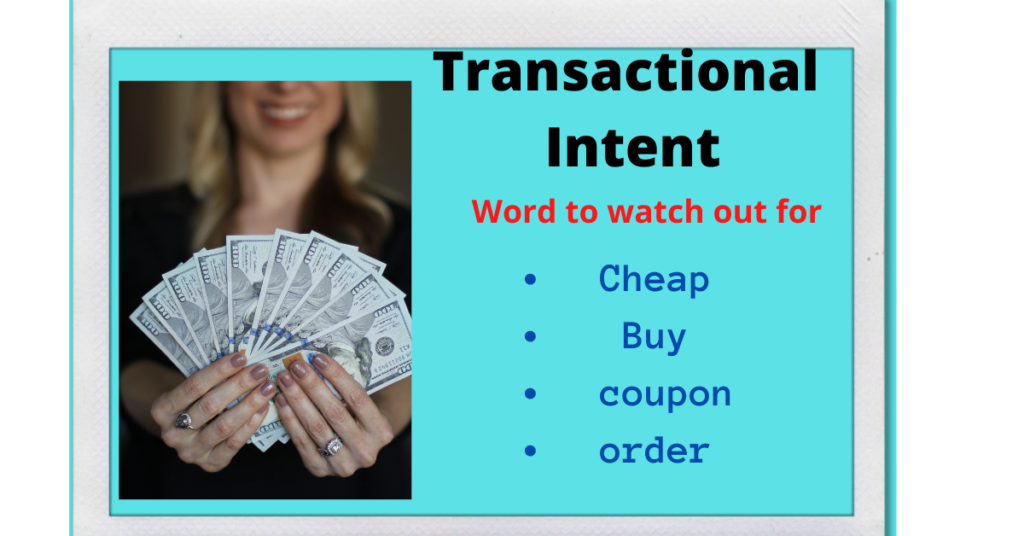
Typical transactional intent keywords are like
- “price”
- “discount,”
- “shipping”
Algorithms on Google clearly identify transactional intent keywords from searchers, and quickly display results for shopping.
For instance if you typed into Google search “best price for apple ear-pods 3.5mm , Google will recognize transactional intent in your keywords, and so throw up shopping options.
So what’s the next wise thing to do ?
Why, just set up ad campaigns around these transactional keywords and watch the conversions happen.
Or even better is to buy PPC ads around these keywords for quicker results, the magic keywords with intent to convert.
Action Points For Leveraging Keyword Intent
| Action Point | Explanation |
|---|---|
| Analyze the search query | Carefully examine the keywords used in the search query. Look for clues in wording, phrases, and context to understand the user’s intention behind the search. |
| Consider search volume and competition | High search volume and high competition often indicate informational intent. Lower search volume with high competition may suggest transactional or commercial intent. |
| Look for action-oriented keywords | Keywords like “buy,” “get,” “download,” or “hire” often indicate transactional intent, where the user is seeking a specific action or transaction. |
| Examine keyword modifiers | Pay attention to modifiers like “best,” “top,” “reviews,” “how to,” or “tips” that provide insight into the user’s intent, such as seeking recommendations or information. |
| Analyze search results | Look at the types of content that appear in the search results. Product listings or e-commerce websites suggest transactional intent, while informative articles indicate informational intent. |
| Consider the user’s stage in the buyer’s journey | Determine if the user is in the awareness, consideration, or decision stage. Phrases like “vs,” “compare,” or “reviews” suggest the consideration stage, seeking comparisons or evaluations. |
| Pay attention to location-based or time-specific keywords | Keywords with location names or time-specific terms indicate intent to find local businesses or up-to-date information. |
| Analyze long-tail keywords | Long-tail keywords, more specific phrases, often indicate clearer intent compared to generic short keywords. |
| Consider the searcher’s demographics | Understand your target audience’s demographics as the intent may differ based on factors like age, gender, occupation, or interests. |
| Use keyword research tools | Utilize tools like Google Keyword Planner, SEMrush, or Moz Keyword Explorer to gather insights into user intent based on search trends and historical data. |
Exploiting Keyword Intent To Convert
Once we understand what keyword intent is, we need to focus on extracting conversions from a specific keyword intent.
And there are proven ways to obtain conversions out of various keyword intents.
However before going further we must acknowledge that only informational, investigational and transactional intents are best suited for conversions.
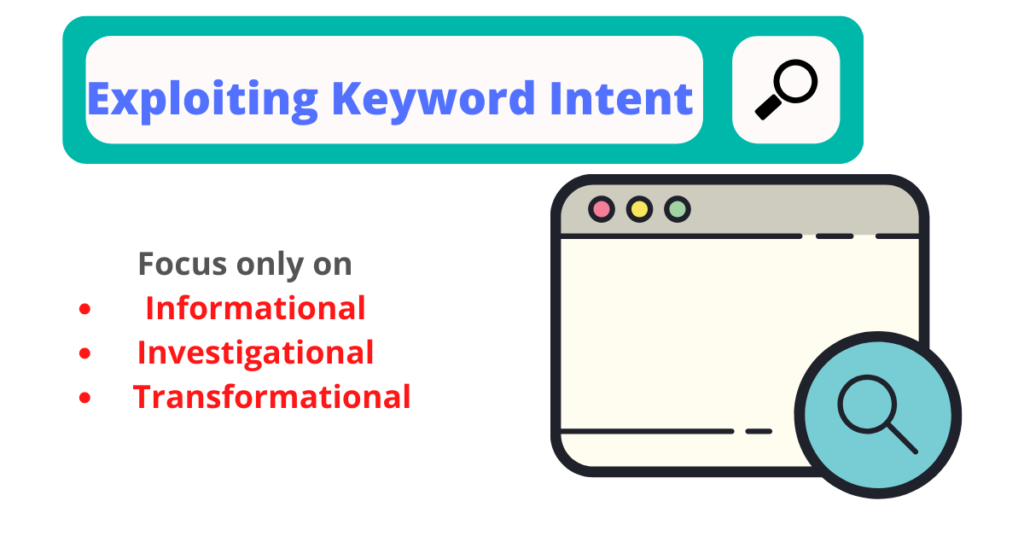
So it is better to ignore the navigational searcher and the tire kicker party. Instead, focus on the informational intent and transactional intent .
Converting From Informational Intent
Email List
One of the most successful ways to convert from informational intent to get the customer on your email list. Later, you can put them through a Lead Nurturing Sequence of emails.
Then send them some of your best promotional offers. This way they are progressively cultivated over time.
Lead Magnets
Valuable content created for obtaining email or contact of users is lead magnet content ,and is mainly used to attract leads or prospects.
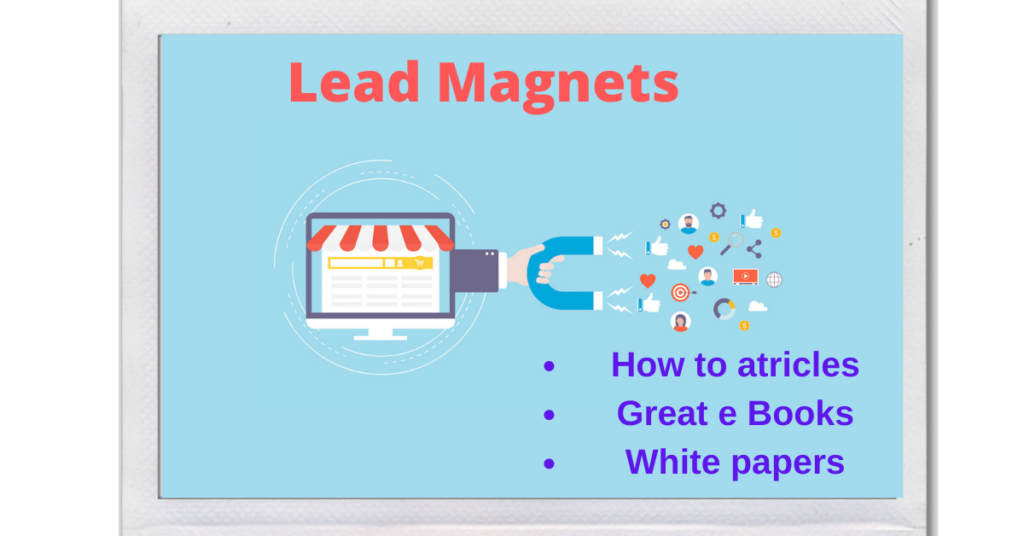
What’s more…..this content is given with opt-in freebies for which a user first has to actively opt-in.
Lead magnets tend to attract specific user traffic, because they match the keyword intent of the prospect. And you are the one creating content for them.
Lead magnets can be ebooks ,whitepapers, or a how to article. Lead magnet is usually generic content, and not related to a specific blog post or page.
Content Upgrade
Content upgrades are incentives directly related to a specific blog post, podcast or video content.
Once a user has shown their intent, you send them a content upgrade. The interesting thing is that this piece of content offers exceptional value to the prospect.
That’s what you need to remember while creating content upgrades.
Content upgrade often has a narrow, niched down focus. This can be an exceptional blog post, a how to article, or a checklist, or a swipe file.
Essentially this is content that offers your prospects quantum value for their interest. In turn, you can ask them to share their email, as a precondition for the content upgrade.
Remember throughout your content creation that your objective is to exploit your prospect’s keyword intent to convert to profit for you.
Converting From Transactional Intent
Landing Page
A landing page is a “no distractions” page on your website exclusively to:
- Capture information of clients (email or phone)
- Create leads of prospects
A homepage with such a capture form is not a landing page, because there’s too much distraction on it.
And that’s not what you want for your prospects.
Ideally a landing page must match what customers are expecting to find on it.
On Page Contact Form
A contact form on your site is a simple and reliable way for visitors to get in contact with you.
With this form they can give you support, or leave thanks, or send inquiries in.
The most commonly used contact form fields include:
• Name
• Subject
• Phone Number
• Message
Along with the contact form also give a clear call to action that gives a solution or tangible benefit in some way.
Address Questions Up Front
Insert a handy FAQ on your product if it needs detailed explanation. Put that FAQ on the page where the prospects will arrive first, and don’t make them jump hoops !
Customizable Sidebar Widgets
You can customize the sidebar widgets on your site to display opt-in content for your prospects. You can show specific content related to that particular category page where your users arrive. So your sidebars serve as great conversion tools too.

Here are some options for using your sidebars:
- Get those credentials noticed. If you have exceptional achievements then showcase them in the sidebar.
- Create precise forms for lead generation
- Transcend the “latest posts”.Besides the commonplace “latest post”, you can show the number of Instagram followers in the sidebar.
- Ask for visitor participation. For example, Digital-Photography-School.com tasks their readers with homework on the sidebars, which gets a warm response.
- Exploit your archives. Some sites display their older evergreen posts again on the sidebar.
Resource Sites
There are excellent resource sites like MarketingSherpa, MarketingProfs, and ConversionXL, which offer amazing solutions to increasing your conversions. In fact, MarketingSherpa gives marketers instructions, statistics, and inspiration to improve their results.
Summary Of Related Keywords And Type Of Intent
Informational:
| Search Intent | LSI Keywords |
|---|---|
| Informational | Guide |
| Practical Advice | Tips |
| Step-by-step Instructions | Tutorial |
| Explainer | Basics |
| Inspirational | Quotes |
| Research | Study |
| History | Origins |
| Facts | Statistics |
| Benefits | Advantages |
| Process | Steps |
| Trends | Analysis |
| Scientific | Research |
| Causes | Reasons |
| Definition | Meaning |
| Solutions | Methods |
| Mechanics | How it works |
| Types | Varieties |
| Comparison | Contrast |
| Examples | Illustrations |
| Applications | Usage |
Navigational:
| Search Intent | LSI Keywords |
|---|---|
| Troubleshooting | Fix |
| Frequently Asked Questions | FAQ |
| Help | Support |
| Customer Service | Contact |
| Login | Sign in |
| Download | Install |
| User Manual | Instructions |
| Membership | Sign up |
| Order Tracking | Track order |
| Store Locator | Find a store |
| Product Return | Return policy |
Transactional:
| Search Intent | LSI Keywords |
|---|---|
| Recommendations | Recommended |
| Cost-related | Pricing |
| Buy | Purchase |
| Discount | Sale |
| Coupon | Promo code |
| Deals | Offers |
| Free shipping | Delivery |
| Order | Checkout |
| Subscription | Membership |
| Trial | Try it out |
Commercial:
| Search Intent | LSI Keywords |
|---|---|
| Top/High-rated | Best |
| Evaluations | Review |
| Comparisons | Versus |
| Latest Updates | News |
| How-to | DIY |
| Pros and Cons | Advantages |
| Product Features | Specifications |
| New Arrival | Fresh |
| Brand | Company |
| Testimonials | Customer feedback |
FAQs
- Q: Why is keyword intent important for SEO and content creation?
- A: Understanding keyword intent helps you align your content with what users are searching for, resulting in higher visibility in search engine results. It enables you to create relevant and valuable content that matches user expectations, improving user engagement and driving targeted organic traffic.
- Q: How can I determine the intent behind a keyword?
- A: Analyze the search query, paying attention to the wording, phrases, and context. Consider search volume, competition, and the presence of action-oriented keywords or modifiers like “best” or “how to.” Additionally, examine search results and consider the user’s stage in the buyer’s journey for valuable insights into keyword intent.
- Q: Can keyword intent vary based on user demographics?
- A: Yes, the intent of a keyword can differ based on user demographics such as age, gender, occupation, or interests. Understanding your target audience’s characteristics and preferences can help you tailor your content to align with their specific intent and needs.
- Q: Which tools can help me understand keyword intent better?
- A: There are various keyword research tools available, such as Google Keyword Planner, SEMrush, Moz Keyword Explorer, and more. These tools provide valuable insights into search volume, keyword variations, and suggested keywords, helping you understand user intent based on search trends and historical data.
Related Posts
Easy Keyword Usage Techniques That Improve Your Website’s SEO
11 Crucial Actions For Improving The SEO Of Your Website
The Top Proven Insider Strategies To Quickly Optimise Keywords On Your Website
Guaranteed Leverage Of LSI Keywords Like Never Before (The 10 Proven Tools)
Conclusion
When you do keyword research, you realize that all keywords are not the same. They differ in their intent, and hence in their ability to convert.
So you want to exploit that keyword intent to convert into profit for you.
Essentially there are four main categories of intent; informational, navigational, investigational and transactional.
Out of these four the most suited for conversion are the informational and transactional intents.
That’s why we recommend you exploit these keyword intents to get great conversions, with lead magnets, content upgrades and on page forms, and customizable widgets.

